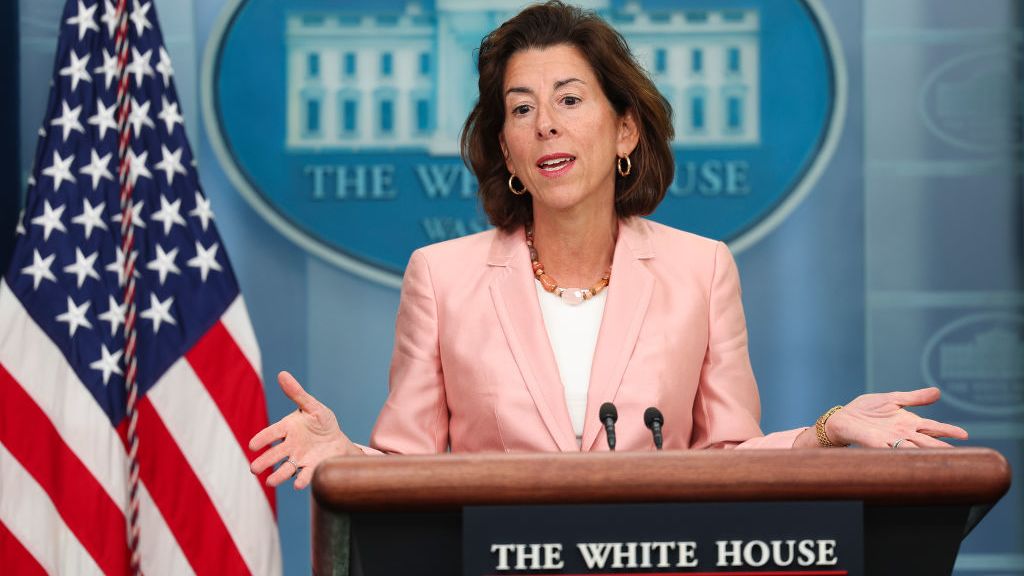Chipmakers receiving CHIPS Act funding ordered to share profits with US government
Chip manufacturers seeking billions in funding must commit to accurate profit projections, diverse hiring practices, and labour agreements


Semiconductor manufacturers who have received funding as part of President Biden’s landmark CHIPS Act will be required to share excess profits with the government and commit to affordable childcare plans.
Companies are required to provide the US Department of Commerce with detailed cash flow projections for proposed projects, which determine the amount of funding they will receive. Those that exceed these projections will be expected to return a pre-arranged percentage of this excess profit to the government.
Firms that seek to draw funding will also be required to expand employment of individuals such as economically disadvantaged women, and those that seek more than $150 million will be required to provide plans for affordable childcare for facility and construction workers.
The requirements state that this must be high-quality care available at a price “within reach” for low-to-medium income households, in an accessible location, and on reliable hours that prevent workers from missing shifts.
“Recipients receiving more than $150 million in CHIPS Direct Funding will be required to share with the US government a portion of any cash flows or returns that exceed the applicant’s projections (above an agreed-upon threshold specified in the award),” the notice of funding opportunity (NOFO) [PDF] stated.
“The Department expects that upside sharing will only be material in instances where the project significantly exceeds its projected cash flows or returns, and will not exceed 75% of the recipient’s direct funding award. Because successful projects will differ considerably in their key attributes, upside sharing arrangements may vary by project, and, in exceptional circumstances, may be waived.”
Funds that the Department of Commerce receives through upside sharing will be put back into the funding for the CHIPS Act, and the NOFO states that in this way success of one firm contributes to the improved long-term health of the US semiconductor industry.
Sign up today and you will receive a free copy of our Future Focus 2025 report - the leading guidance on AI, cybersecurity and other IT challenges as per 700+ senior executives
What is the CHIPS Act?
When the CHIPS Act was passed in August 2022, it freed $280 billion in funding for semiconductor research, development and manufacturing.
RELATED RESOURCE

Why aren’t factories as smart as they could be?
How edge computing accelerates the journey to a remarkable factory
Under the terms of the NOFO, $38 billion is available in direct funding for semiconductor firms, alongside up to $75 billion in direct loans or guaranteed principle.
Firms are not expected to receive more than 5-15% of project capital expenditures in direct funding, and total awards will not exceed 35%.
The money cannot be used for stock buybacks, and applications must outline a company’s five-year plan for stock buybacks and dividend payments.
The statute has been a key element of the Biden administration’s vision for America in its aim to improve the US’ domestic manufacturing capabilities following shortages that at their worst point in 2021 meant the US had less than a five-day supply of chips.
It has also sought to end reliance on Chinese semiconductor manufacturers whilst improving the country’s domestic labour market. In September, it was announced that companies that receive funding under CHIPS will not be able to invest it in China, and the NOFO bars companies under the direct or indirect control of “foreign entities of concern” from receiving funds.
In an interview with the New York Times, commerce secretary Gina Raimondo said that the requirements were included in part to dissuade companies from underplaying their projected profits to take advantage of the funding.
“We don’t want to spend a dollar more than necessary to make these projects happen,” said Raimondo.
The plans also lay out extensive requirements for firms to follow diverse hiring practices for their facility workers and engage with partners including labour unions, workforce boards, and educational institutions.
These run alongside a mandate for long-term upskilling initiatives to strengthen the US semiconductor workforce.
The NOFO urged companies to agree to project labour agreements (PLA) with their construction workers, or else prove that continuity plans are in place to deliver projects on time.
Applicants will also be required to design and present a climate and environmental responsibility plan for their project, outlining how they will use renewable energy to the largest possible extent, conserve water, and report on their project’s environmental impact across its lifecycle.
In mid-2022, a number of firms announced their intent to establish or expand existing chip manufacturing facilities using the funding.
The act went through a prolonged legislative process in Congress, leading Intel to pause development on its $20 billion Ohio chip plant until the subsidies were confirmed.
In November 2022, it was reported that chip giant Taiwan Semiconductor Manufacturing Co (TSMC) was planning a $12 billion investment in an Arizona plant, and this has since been confirmed as a $40 billion investment to produce 600,000 wafers per year.
Applications are being accepted on a rolling basis, with the window for statements of interest now open.
Full applications for leading-edge facilities will be accepted from 31 March, pre-applications for current-generation and back-end facilities will be accepted from 1 May, and full applications for the same will be accepted from 26 June.

Rory Bathgate is Features and Multimedia Editor at ITPro, overseeing all in-depth content and case studies. He can also be found co-hosting the ITPro Podcast with Jane McCallion, swapping a keyboard for a microphone to discuss the latest learnings with thought leaders from across the tech sector.
In his free time, Rory enjoys photography, video editing, and good science fiction. After graduating from the University of Kent with a BA in English and American Literature, Rory undertook an MA in Eighteenth-Century Studies at King’s College London. He joined ITPro in 2022 as a graduate, following four years in student journalism. You can contact Rory at rory.bathgate@futurenet.com or on LinkedIn.
-
 Trump's AI executive order could leave US in a 'regulatory vacuum'
Trump's AI executive order could leave US in a 'regulatory vacuum'News Citing a "patchwork of 50 different regulatory regimes" and "ideological bias", President Trump wants rules to be set at a federal level
-
 TPUs: Google's home advantage
TPUs: Google's home advantageITPro Podcast How does TPU v7 stack up against Nvidia's latest chips – and can Google scale AI using only its own supply?